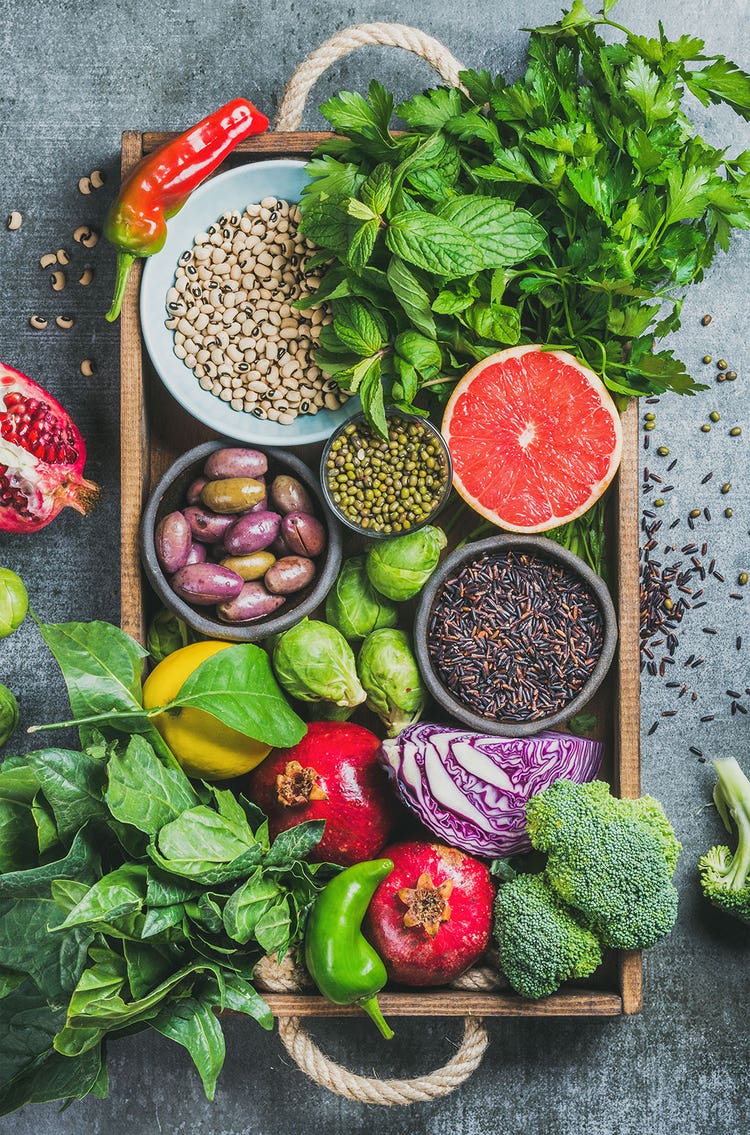Why We Should Bet on Whole Foods

Here’s the simple reason that a simple diet can prevent disease.
There’s a gif that might have made its way onto your Facebook feed numerous times in various forms. It asks, “Do You Know?” and then lists numerous foods with superhuman powers. For instance, “Pineapple burns fat and tones the stomach” (not really, only exercise can do that), “Blueberries help balance blood sugar,” and “Sweet potatoes help cure IBS.” Some of these things are true and others haven’t been proven, but the theme is a powerful, and lately popular, one: Food can heal.
This idea of food as medicine isn’t a new one. But it begs the question: Will all this healthy eating keep disease at bay?

“In every kind of population around the world, people who eat minimally processed vegetables, fruits, whole grains, beans, lentils, nuts and seeds, with or without seafood, with or without limited amounts of dairy, with or without a little bit of meat and who mostly drink plain water when they are thirsty, with or without wine but generally not soda, do the best,” says David L. Katz, M.D., MPH, director of the Yale University’s Yale-Griffin Prevention Research Center and founder of the True Health Initiative (truehealthinitiative.org). “And they do the best in every way imaginable: They have the least heart disease; they have the least obesity; they have the least diabetes; they have the least dementia; they have the fewest strokes; they have the least cancer; they live the longest; and I could keep going.”
This way of eating is so simple. But we get so caught up in the trendy diet du jour and what the last superfood is that we use this as an excuse for why we don’t eat well. In truth, eating a bunch of buzz-worthy superfoods isn’t going to make our health super, especially if we are eating these “foods that heal” chased by a double cheeseburger.
The state of food, not its status, matters
In fact, it doesn’t matter whether you eat blueberries, strawberries or goji berries. “The important thing is that you eat food, preferably food that is as close to nature as possible,” says Brenda Rea, MD, associate director of the Family and Preventative Medicine Residency Program at Loma Linda UniversityMedical Center.
When we eat processed foods, the three nutritional enemies—sugar, salt and saturated fat—permeate our diets and can adversely affect our health. “The food we eat, whether it is good or bad, can change the expression of our genes,” Rea says. “What that means is that it can turn on the good genes that can keep us healthy, and on the flip side, turn on the bad genes that make us sick. And that is the crux in where I see food as medicine.”
We see this in the scientific literature. Katz points to a 1993 paper published in JAMA: the Journal of the American Medical Association called “Actual Causes of Death in the United States.” It stated that 80 percent of the premature deaths in our country were attributed to poor diet, lack of physical activity and tobacco. “And in the 24 years since, that has remained true but diet has overtaken tobacco as the No. 1 cause,” he says.
Recently, JAMA published a paper in its March 7, 2017, issue that took a closer look at diet as it related to deaths from cardiometabolic diseases, such as heart disease, stroke and Type 2 diabetes. The authors found that an estimated 45 percent of all deaths caused by heart disease, stroke and Type 2 diabetes are associated with eating either too much or too little of just 10 food categories. Of these diet-related deaths, 9.5 percent were attributed to consuming too many salty foods, while 8.2 percent were associated with eating a high amount of high-processed meats. Lacking nuts or seeds, high omega-3 fatty-acid seafood, vegetables and fruits in the diet contributed respectively to 8.5, 7.8, 7.6, and 7.5 percent of these deaths.
“The bottom line is finding a substantial nutrition pattern that you can have that is disease preventing and health promoting and that you can sustain over a long period,” Rea says. Katz and Rea both subscribe to eating minimally processed, mostly plant-based foods.
Disease-causing nutrients would disappear
Considering that a lot of people are eating things that shouldn’t be considered real foods, most of the disease-causing nutrient concerns—salt, as well as sugar and saturated fat—would disappear if we subscribed to the doctors’ food philosophy. “Most of our salt comes from processed foods and fast foods, and that problem would go away,” Katz says. “Most of our sugar comes from highly processed foods and soda. Well, that problem would go away. Most of our saturated fat comes from meat and dairy, which should be a small part of our diets anyway. So if we get the foods right—wholesome foods in sensible combinations—it fixes every nutrient concern.”
If we got down to business and simply ate minimally processed vegetables, fruits, whole grains, beans, lentils, nuts and seeds, with or without seafood, with or without limited amounts of dairy, with or without a little bit of meat and drank mostly plain water when thirsty, Katz believes that we could possibly live to 90, 95, 100 and go to sleep one night and just not wake up the next day. “It is possible,” he says. “That’s what they do for the most part in the Blue Zones [the areas of the world where people live the longest]. It’s an unimaginably better world that we should be trying to imagine because we have the means.”
Photo credit: ThanhThu Adobe Stock 142492